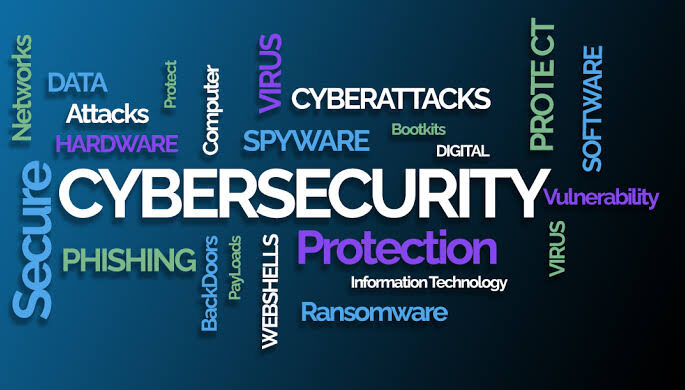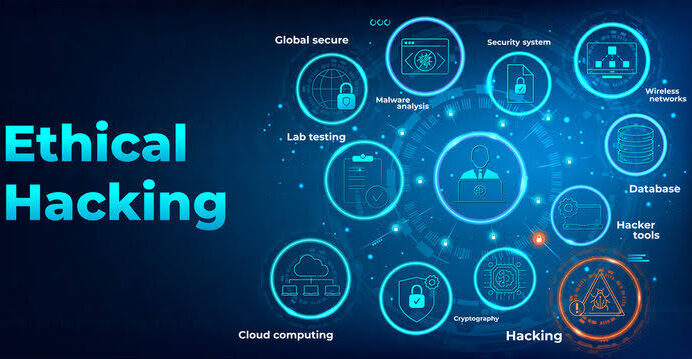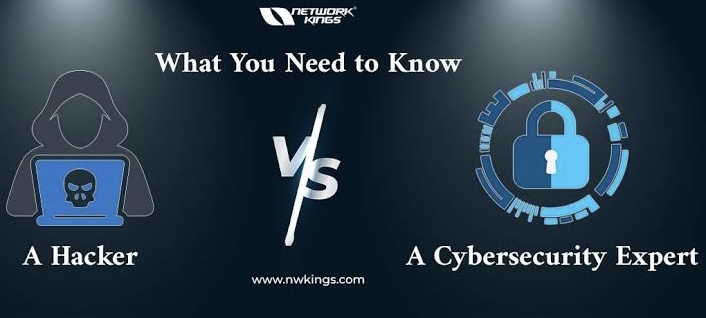Understanding the Basics
Imagine your computer and all your online information as a precious treasure locked in a vault. Cyber security is like the overall plan and the guards that protect this vault, ensuring that no one can break in and steal your treasure.
Ethical hacking, on the other hand is like hiring a trusted expert to test the vault’s security by trying to break in, just to see if there are any weaknesses.
What is Cyber Security?
Cyber security is the practice of protecting computers, servers, mobile devices, networks, and data from malicious attacks. It encompasses a broad spectrum of tools, techniques, and processes designed to safeguard sensitive information and ensure the integrity, confidentiality, and availability of digital assets. In an era where cyber threats are increasingly sophisticated and pervasive, cyber security serves as the frontline defense against a variety of malicious activities, including hacking, phishing, malware, ransomware, and other forms of cybercrime.
The field of cyber security covers various domains such as network security, which focuses on protecting the infrastructure and data transmitted across networks; information security, which safeguards the confidentiality and integrity of data; application security, which involves securing software applications from vulnerabilities; and operational security, which pertains to the processes and decisions for handling and protecting data assets. Additionally, cyber security includes disaster recovery and business continuity planning to ensure that an organization can quickly recover from any cyber incidents and continue operating with minimal disruption.
Think of cyber security as a comprehensive defense strategy for all your digital assets, akin to a fortress with multiple layers of protection. This strategy involves regular updates and patches to software and systems, implementation of firewalls and intrusion detection systems, encryption of sensitive data, and the development of robust security policies and protocols. Furthermore, it includes educating employees and users about safe practices, such as recognizing phishing attempts and using strong, unique passwords.
Overall, cyber security is an ongoing, dynamic process that requires vigilance, expertise, and proactive measures to protect against the ever-evolving landscape of cyber threats.

What is Ethical Hacking?
Ethical hacking, also known as “white-hat” hacking, is the practice where skilled professionals use their extensive knowledge and expertise to identify vulnerabilities in a system, network, or application. These ethical hackers play a critical role in enhancing the security posture of organizations by proactively finding and fixing security flaws before malicious hackers, known as “black-hat” hackers, can exploit them.
Ethical hackers can be likened to friendly detectives or security consultants. They use their hacking skills for good, working alongside organizations to conduct penetration testing and vulnerability assessments. During these assessments, ethical hackers mimic the tactics, techniques, and procedures of potential attackers, but with the organization’s permission and for the purpose of improving security. Their goal is to uncover weaknesses that could be exploited by cybercriminals, thereby preventing data breaches, unauthorized access, and other forms of cyber attacks.
Once vulnerabilities are identified, ethical hackers report their findings to the organization’s IT and security teams. They provide detailed recommendations on how to address these issues, which may include applying patches, configuring systems securely, updating software, or implementing additional security measures. This collaborative effort ensures that the organization’s digital infrastructure is robust and resilient against potential threats.
The scope of ethical hacking is broad and covers various domains such as network security, web application security, wireless network security, and social engineering. Ethical hackers must stay up-to-date with the latest developments in cyber threats and security technologies. They often hold certifications such as Certified Ethical Hacker (CEH), Offensive Security Certified Professional (OSCP), and other recognized credentials that validate their expertise and adherence to ethical standards.
In essence, ethical hacking is an essential component of a comprehensive cyber security strategy. By identifying and mitigating vulnerabilities, ethical hackers help organizations protect sensitive data, maintain customer trust, and comply with regulatory requirements. Their work is vital in an increasingly interconnected world where cyber threats are constantly evolving and becoming more sophisticated. Through their proactive efforts, ethical hackers contribute significantly to the overall safety and security of the digital landscape.

Key Differences
Purpose:
- Cyber Security: It’s primary goal is to protect and defend against cyber threats.
- Ethical Hacking: The main objective is to find and fix security vulnerabilities.
2. Approach:
- Cyber Security: It involves implementing and managing security measures like firewall, antivirus software, and Encryption.
- Ethical Hacking: This involves simulating cyber attacks to test and evaluate the security measures in place.
3. Roles:
- Cyber Security Professionals: these are the defenders who set up and maintain the security infrastructure.
- Ethical Hacker: These are the testers who actively search for weak spots and Suggest improvemts
How they work Together?
Cyber security and ethical hacking are like two sides of same coin. While cyber security professionals built and maintain the defense system, ethical hackers test, these Defenses to ensure they are strong enough to stand real attacks. Together, they create a robust shield that protect sensitive information and keeps the digital world safe.
In Summary
Cyber security is about building a strong fortress to protect your digital world. Ethical hacking is about hiring experts to test this fortress And find any cracks before the bad guys do. Both are in ensuring that your information remain secure and out of the hands of cybercriminals.


Great write-up on Ethical Hacking vs. Cyber Security! Your explanation really clarifies the distinction between these critical aspects of digital security. Thanks for shedding light on such an important topic!”
This post beautifully captures the nuanced relationship between ethical hacking and cybersecurity. It highlights how ethical hacking serves as a proactive measure to bolster defenses, complementing the broader efforts of cybersecurity professionals. Understanding these distinctions is crucial in fostering a robust defense against evolving cyber threats. Well articulated!